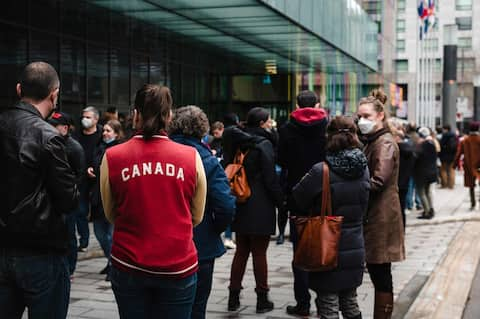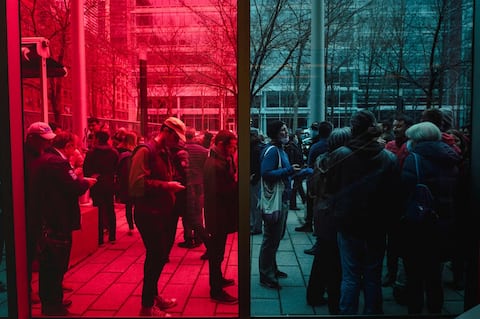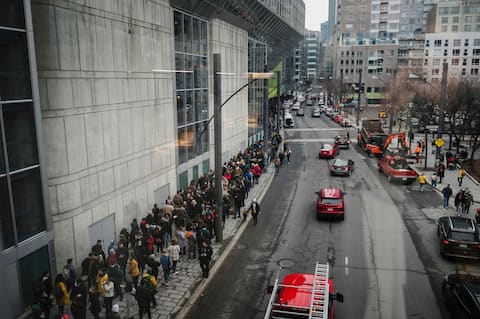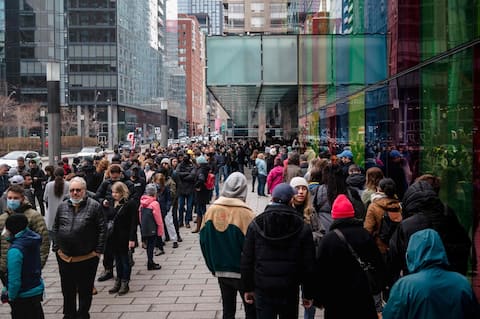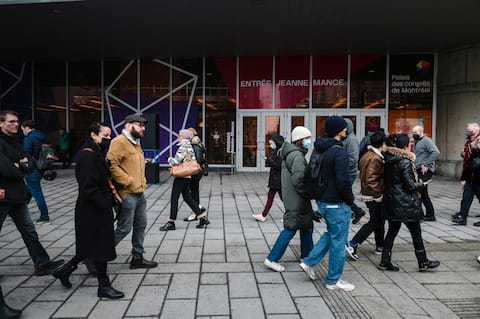
Gray weather and a long wait around the Palais des Congrès in Montreal did not stop the French from coming to vote on Saturday in the first round of the French presidential election.
• Read also: Macron leads, narrow gap with Le Pen in the second round
People have been present since seven in the morning, two hours before voting opens, to make sure the nightmare of the last (2017) presidential election is not revived.
“We waited four hours five years ago, so we tell ourselves we’re still on time,” testified Mael Amselm, who had already been waiting for more than an hour.
While some are happy to see citizens’ enthusiasm for these elections, others fear that the wait will play on their lack of motivation.
“I have friends who don’t come to vote because it takes so long. Some may dissuade me, that’s for sure,” said Jerome Kokoro, who first came to vote in the capital.
The French Consulate in Montreal took all measures to avoid the long wait, by choosing a place with a large reception capacity and adding more than ten polling stations.
But the French were armed with the patience to assert their right to vote, especially since their interest in the election campaign did not wane abroad.
The gap has also narrowed in the latest polls between outgoing president, Emmanuel Macron, and National Rally candidate Marine Le Pen, suggesting a scenario that could be similar to what happened in 2017, with the candidates in the second round. .
The candidate of the radical left, Jean-Luc Mélenchon, began to advance in voting intentions, positioning himself in front of the controversial candidate from the far right, Eric Zemmour.
Remember that the French also have a choice between Valérie Pécresse (Les Républicains) and Anne Hidalgo (Socialist Party), two candidates from the parties that were most well established a few years ago, but whose favour has recently faded. In all, 12 candidates are vying for the highest office of power.
“It’s kind of a last-chance election. The environment remains one of the main topics, and with the latest IPCC report giving us three years, that is little or no now,” said Julia Fortin Morrow, a 27-year-old young woman. It never happens.”
“There are quite a few people who didn’t vote five years ago and are here today. Everyone kind of woken up to everything that happened with COVID, and now Ukraine.”me Amselm, who has been living in Montreal for ten years.
And the lack of an election campaign by candidates in France, in comparison with the activity of other years, did not make the choice easy for voters.
“So far, I’m probably 1:30 a.m. away from being able to vote, I’m still deciding, because there hasn’t been a major official debate this year,” said Mile Amselm.
The French present were all in agreement on one point: they had to do their duty as citizens for the country that had seen them grow.
“It’s a political and social event, the atmosphere is good and the people are happy to be there,” Luke Hughes summed up, a few minutes after casting his vote.
French presidential elections in brief
- The President of the French Republic is elected for a term of five years (five years).
- Candidates who wish to run must first collect 500 sponsorships from elected officials.
- The president is elected by direct universal suffrage, that is, by an absolute majority of the votes of the electors.
- If this majority is not obtained in the first ballot, a second ballot shall be taken 14 days later.
- Voting takes place on Sunday in the French capital, but takes place the day before at polling stations located abroad.
Polling stations for the French Consulate in Montreal in numbers
- 67,132 French registered with the Montreal Consulate in 2022;
- 39 polling stations (compared to 24 in 2017);
- 4000 agents sent for 1Verse election round
- More than 90% of those registered with this consulate live in Montreal;
- 40% participation rate on 1Verse 2017 tour.
